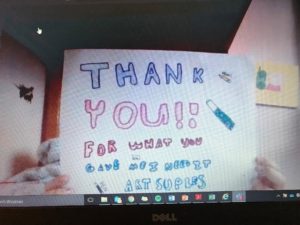TRANSPARENCIES
a monthly newsletter from Integral Care [printfriendly]
a monthly newsletter from Integral Care [printfriendly]

A new school year can cause feelings of apprehension for children and youth. Going back to school this fall will look, and certainly feel, different than ever before – likely creating more feelings of uneasiness. Even if a student isn’t anxious, their parent likely is, impacting the overall feelings about the coming year. Given the current environment and the lack of certainty, how can we support our children to build resilience and well-being? A healthy parent, guardian and/or family is a child’s foundation for well-being. As important as it is to support our children’s mental health amidst the uncertainty, paying attention to our own mental health must be a priority. Parents, teachers and service providers need to be aware of the stress and anxiety they may be experiencing during these challenging times. We’ve compiled a list of resources, groups and webinars to help support the adults who provide a critical foundation for the youngest in our community.
Since the start of COVID-19 and the most recent racial injustices, many people have witnessed behavioral changes in their children. Increased irritability or anger, excessive worry or sadness, changes in sleep or appetite, or socially isolating and withdrawing from others are typical signs that your child is grappling with stress, anxiety and maybe depression. While the stress and anxiety may be situational, we know that 50% of all lifetime mental illness begins by age 14, and 1 in 5 youth ages 13 to 18 has a diagnosable mental health need. Right now, it is especially important for parents to tune in to how their children are doing. Early identification and help can change a life for the better by jump starting recovery. Even with the challenges of COVID-19, mental health care is readily available.

Summer virtual group project supplies
If you are concerned about your child, reach out to your pediatrician or connect with a mental health professional. Integral Care’s Child and Family Services (CFS) is providing intake appointments, counseling, psychiatric and wraparound team services through telehealth. When needed, face-to-face visits are available. This summer, Integral Care therapists are running 24 virtual groups with elementary, middle and high school students. The groups provide opportunities to engage socially and decrease loneliness, while building coping skills and self-esteem. In addition to supporting children, we’re offering support for parents and teachers. Our support groups (in both English and Spanish) help parents navigate parenting during a pandemic, and teachers navigate the stress of adjustments in how we connect and educate. CFS is also providing teachers with virtual suicide prevention training and orientation to our services before school starts.
No matter what this fall has in store for us, Integral Care is committed to helping the children and youth of Austin-Travis County access the mental health supports they need to reach their full potential. Just like we need experts to build a house, mental health experts can help your family with the skills and resources needed to thrive – at all stages of life.

David Evans
Chief Executive Officer
Integral Care continues to provide services – mostly through phone and video – but face-to-face services are available. Federal and state declarations officially extended the telehealth and telephonic service allowance through October 23, 2020. This extension will remain in effect unless the U.S. Secretary of Health and Human Services ends the public health emergency earlier. Integral Care continues to prepare for a phased approach to fully reopening in-person services, which will be a hybrid model of face-to-face and virtual client care. As we have seen throughout the pandemic, things can quickly change. To that end, an October 23rd re-open is not set in stone. Integral Care will remain flexible to best meet the needs of our clients and staff, while following Austin Public Health and CDC guidelines. As always, the health and safety of our clients, staff and the community is of utmost importance. For more information about Integral Care’s current COVID-19 operations, click here.
School-Based Counseling: Mental Health Care Where Children and Youth Are
Mental health issues impact all of us, including the youngest members of our community. School-based counseling is vital for early intervention and prevention. With school time moving to virtual education, counseling services are provided through telehealth. Usually, services are provided directly on campus, allowing school staff to quickly refer students to this easy-to-access program. School-based counseling helps identify potential mental health issues early and gives students the tools they need to work through emotional challenges. Being located on campus reduces the stigma of seeing a counselor and students even bring their friends when they see someone needing help. Parents are able to provide their children access to extra emotional support without having to leave work, reducing absenteeism from school and negative impacts on the family.
Integral Care provides year-round, school-based counseling across 3 Independent School Districts (ISDs) – Del Valle, Manor and Pflugerville – as well as East Austin College Prep, a public charter school. Our 30 licensed therapists provide immediate and ongoing emotional support to students through assessment, therapy and embedded case management services. They also collaborate with teachers, school staff, administrators and parents to improve the health and well-being of our students.

As soon as school closed in March, we began providing services virtually, using the video conference platform TEAMS. We kept the momentum going over the summer with our 24 summer groups for children and youth in elementary through high school beginning in June. Thanks to support from the Integral Care Foundation, students have received art supplies to do activities together such as painting rocks with inspirational sayings and planting succulents. The groups help students practice social skills and connect with others during this summer of social isolation. According to Stacy Spencer, Practice Manager of School-Based Systems of Care, our virtual services have been a success.
Luckily, kids are tech savvy. Schools provided Chrome Books to many kids who didn’t have access to a home device. It’s obviously better to be in person, but some kids have done better in telehealth, especially those who are really shy. That’s been a nice surprise.
Healthy families are the cornerstone of a strong community. Integral Care and our collaborators at Pflugerville, Manor, Del Valle ISDs and East Austin Prep are committed to helping Travis County families build their health and well-being so they can thrive and meet their full potential. If you or your child are experiencing anxiety or any signs of a mental health issue, do not be afraid to ask for help. Child and Family Services at Integral Care can be accessed at 512-472-4357.
 To support our children’s mental health, one of the most helpful things we can do is model calm, confident behavior. An anxious parent/guardian can mean an anxious child. Whether you’re a parent/guardian, teacher or mental health professional, we suggest some go-to webinars, groups and resources to help you shore up your well-being during COVID-19 and beyond.
To support our children’s mental health, one of the most helpful things we can do is model calm, confident behavior. An anxious parent/guardian can mean an anxious child. Whether you’re a parent/guardian, teacher or mental health professional, we suggest some go-to webinars, groups and resources to help you shore up your well-being during COVID-19 and beyond.
Families & Teachers:
Professionals:
We hope you find this list helpful, and if there are other resources you’d like us to know about, please email us at Communications@IntegralCare.org.
July 2020: Minority Health Disparities & COVID-19
June 2020: Stronger Together
May 2020: Surviving and Thriving During Uncertain Times
April 2020: Persevering During COVID-19
March 2020: Collaborations and Initiatives to Improve Health for the IDD Population
February 2020:Solutions to Health and Health Care Disparities
January 2020: Sucicide Prevention a Local Effort
December 2019: A Year of Thriving Care & Collaboration
November 2019: Teamwork and Collaboration Impact Homelessness in Travis County
October 2019:Making Strides for World Mental Health
September 2019: Taking Steps to Recovery Support
August 2019: Working Together for Child & Youth Mental Health
July 2019: Legislative Wrap-Up – Some Bipartisan Wins for Healthcare
June 2019: Strengthening Access for Veterans and the Entire Military Family
May 2019: Women and Mental Health
April 2019: Legislative Session Status Report
March 2019: Making Opportunities for Recovery More Accessible
February 2019: Recovery is Possible
January 2019: Stronger Outcomes Through Collaboration
December 2018: Looking ahead to the 86th Texas Legislature
November 2018: How Tech is Changing the Face of Mental Health
October 2018: A Few Questions Could Help Save a Life
September 2018: Anyone Can Save a Life
August 2018: A Milestone Moment
July 2018: Equity in Mental Health Care for All
June 2018: Expanding Services for Veterans
May 2018: Your Mental Health Toolkit
April 2018: Time of Terror Calls for Increased Emotional Support
March 2018: Stopping the cycle of incarceration for individuals with mental illness
February 2018: Equity in mental healthcare for everyone
January 2018 : Improving Mental Health Through Partnership & Collaboration
December 2017: Strength Through Community
November 2017 : Healthy Lifestyles Improve Well-Being
October 2017 : National Child Health Day
September 2017 : Strengthening Families and Communities